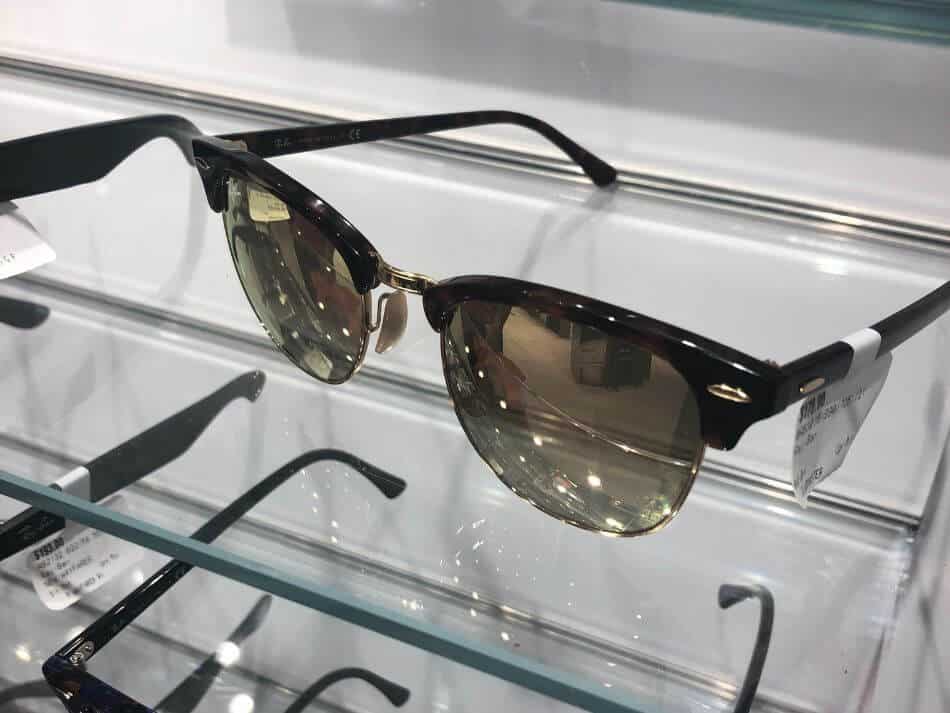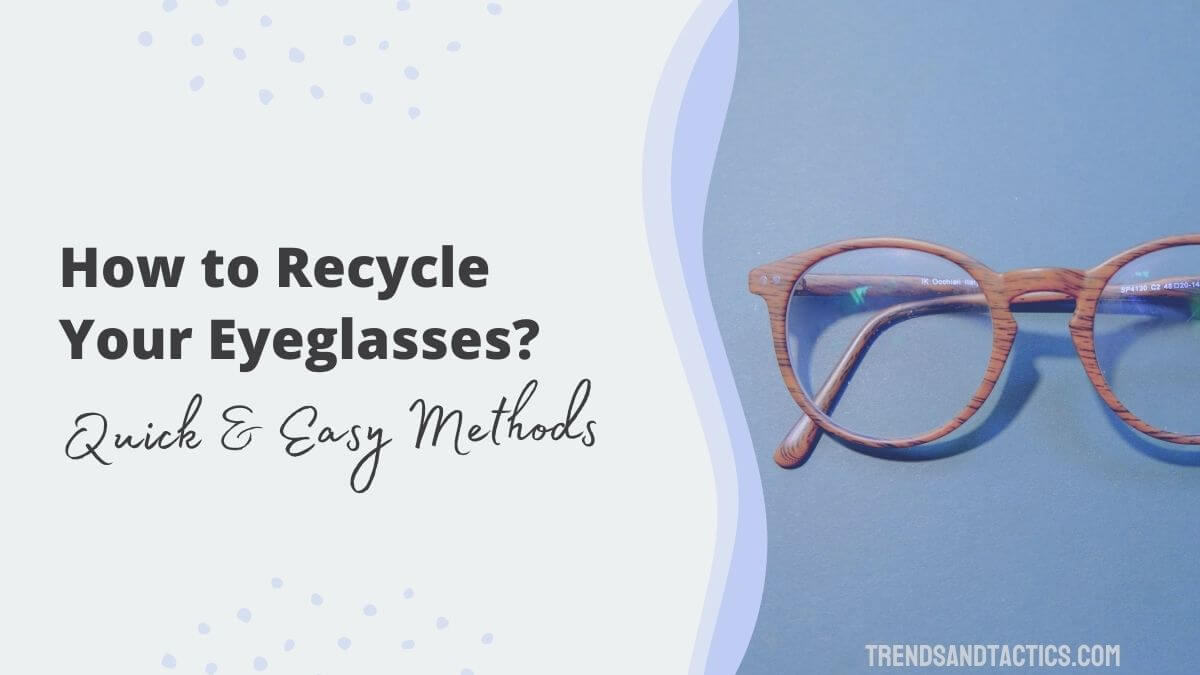Most people need glasses at some point in their life, ranging from corrective lenses to sunglasses: but what do you do when you’re ready to move on to a fresh pair?
Unfortunately, these tools for vision correction can cost hundreds, and it can feel like a waste of money if you don’t know how to recycle glasses.
Whether you’re ready to move on to a new pair, or you’re simply asking yourself, ‘can you recycle eyeglasses,’ here’s everything you need to know.
Can you recycle eyeglasses?
Eyeglasses can be recycled, but it does take a little bit of work, requiring you to take them apart so you have a bare frame of metal, wood, or plastic, the glass lenses, and the metal screws that held them together.

Once deconstructed, every piece of a pair of glasses can be donated. Similar to recycling old computers or light ballasts – just about anything can be recycled with the right process.
Some limitations here that can hold you back are whether the glass of the glasses is scratched or broken.
In some cities and municipalities, broken glass is generally not recyclable for numerous reasons. If your glasses are cracked or broken, wrap them in tape to keep the glass in place, and then throw it away.
Donating vs. Recycling Eyeglasses
Although many mix up the two terms, there is a difference between donating and recycling eyeglasses.
Donating is when you give it to a service like a nonprofit or a company that will repurpose the glasses so that they can be worn again.
Generally, recycling means that you’re having it scrapped or made to be reused for its parts instead of directly as the same pair of glasses.
For example, some people make money 3D printing glasses and can use recycled parts for the components that can’t be 3D printed, such as the lens.
Donating Eyeglasses
Pros:
- You can get a tax deduction from some nonprofits
- You get the good feeling of helping a company
- You can keep things out of landfills
Cons:
- Besides taxes, there’s usually no financial benefit
- If there are minor scratches or issues, they’ll often be tossed in the trash
- Researching companies to ensure they align with what you want in a nonprofit can stress some people out
Tactics for Success
- Although most donation services do clean and prepare glasses for their next owner, it’s a good idea that you do this ahead of time to help the process.
- All nonprofits have to be public about their spending, so if you’re unsure about an organization, look into it and see if their spending aligns with your values.
Recycling Eyeglasses
Pros:
- You save glasses from going into landfills
- Some companies will pay you for your glasses’ parts
- You can get a tax deduction if you recycle through a nonprofit that uses its parts
Cons:
- If you don’t take them apart first, some recycling processes will trash them because of the time it takes to process them
- Cracked glass can’t be donated and has to be trashed
- There are a couple more steps to passing them on
Many people conflate the two as the same, and in some ways, by donating eyeglasses, you are allowing them to be recycled and reused.
Moving forward, we’ll be discussing both ways to pass on glasses and how you can accomplish them!
Trends on the Rise
Over 75% of adults use some sort of vision correction, making them go through a new pair every one to three years. The eyewear market is expected to grow by $7 billion within the next year: so donating and recycling creatively could let you have a hand in this industry!
Where to recycle and donate eyeglasses?

If you’re getting ready to donate or recycle your glasses: there are tons of options at your fingertips!
These are the top choices you can choose from and what they offer.
1. Local Recycling Services
This is classic recycling and what many may assume they’re supposed to do when they’re giving up a pair of glasses.
Local recycling services are best for glasses where the glass itself is intact, but the frame might be broken or is so out of style that you don’t think anyone would be interested in them.
The service is usually run by your local city government and is something that you pay taxes for. This is the only one where you’ll have to take the glasses apart before you discard them.
Research what type of material the frame is made out of before recycling it to ensure that it’s properly recycled.
Tactics for Success
- If the glasses are plastic and break down into parts that are smaller than a credit card: they’re not going to be able to be recycled. So when buying new glasses, consider this when thinking about frame material.
- The screws that hold a pair of glasses aren’t recyclable, but some towns and cities do offer scrap-metal containers at their recycling center that will allow this metal to be used further. Seek these out when recycling.
2. Lions Club International
The Lions Club is an international non-political service organization from Illinois that accepts donations of eyeglasses to disperse them to those in need across the world.
This organization has collection sites in twelve states, as well as a mailing address. They ask that the glasses be at least in good condition with no more than a few scratches.
Donating to them does allow a tax deduction since they’re a nonprofit!
3. Local Optometrists
This donation and recycling option will require you to do a little research depending on where you live, but it’s a fantastic option for those who don’t live near any other services.
In addition, many optometrists will offer a discount on a future pair of glasses if you donate a current pair.
This is a great budgeting strategy to be aware of, whether you might be quickly saving for a house or save up for expensive vehicle repairs.
These donated glasses are often used for those who can’t afford new glasses and offer impoverished people the chance to be able to see.
Trends on the Rise
Giving is a tradition in America, with citizens giving over $470 billion in 2020. So it’s important to research the nonprofit you go with, to ensure you pick one that aligns with your needs and morals.
4. ReSpectacle
If you don’t want to drive anywhere and you’re interested in donating: this is the service for you! ReSpectacle is a nonprofit that accepts mailed-in donations to pass on glasses to another user.
They’ll ask you to fill out a short form about the glasses and then walk you through the steps to donate.
When they receive them, they clean, categorize and then put them on their online database to either donate or sell for donations to further support the organization’s efforts.
Each of these options offers something completely different and gives you the chance to make a change with your glasses!
Can you make money from recycling eyeglasses?
The main way to make money from recycling your glasses is to get a tax deduction for donating them to specific nonprofits.
These organizations offer primarily religious, educational, scientific, literary, or charitable things to their community, like any of the nonprofits listed within this article.
The average tax deduction for a pair of glasses would be based on the value of the glasses. For example, if you could sell them for $100 and donate them instead, you could get a $100 deduction.
Be aware that how much you bought them for doesn’t matter, only how much they’d be valued when you donate them.
You can, of course, sell your eyeglasses! However, name brands fetch far more money on sites to sell stuff, and the best platform for this would be something like eBay that allows you to list everything down to the lens and prescription.
3 Tips to Make More Money Recycling Glasses
If you want to ensure you can make more money off of these in the future: it’s not impossible!
These are the top tips that will help you ensure your new glasses will still be valuable when it’s time to pass them on.
1. Start With a Known Brand
The most well-known and sought out brands for eyeglasses right now are Ray-Ban, Gucci, and Tom Ford.
Each of these will lose a little value when you buy them, depending on how common they are.
If they become discontinued by the time you’re ready to sell them: the frames can be worth far more.
2. Seek Out a Timeless Look
Look for stylish eyeglasses, but don’t feel too set in any specific era.
If you get a pair that feels very right now, they might not be sought after when it’s time for you to sell them finally.
3. Ensure You Take Good Care of Them
The most important thing about used eyeglasses: is that they’re well taken care of. Glasses can add personality and interest to a person’s face, so they must be in great condition.
While using them, make sure you keep them safe from scratches, rusting, and stains that can come from everyday life.
Wrapping Up
Although it takes the average person a couple more steps of research to figure out how to recycle their glasses, this option gives you the best chance at minimizing your climate impact while possibly earning money.
So next time you’re ready to move on to a fresh pair, consider recycling your old ones!
Erin is a business teacher and mother of three. When she’s not in the classroom or fulfilling her obligations as an A+ hockey and lacrosse mom, she’s working on her latest article.






